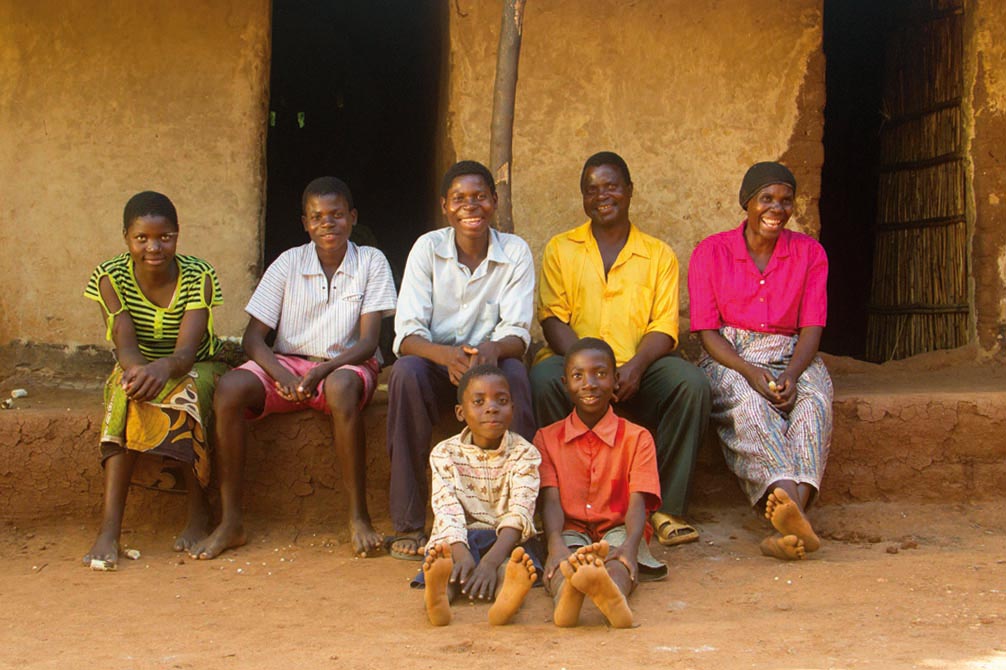Doney (pronounced door-nee) is a quiet and humble woman but, thanks to an innovative program supported by Caritas Australia, she’s creating big changes in her life – and in her village.
Doney beams when she talks about how much her life has changed in the last five years. “My life has been transformed,” she smiles. “I am now more knowledgeable on a number of issues and I have a vision.”
Located in East Africa, Malawi is one of the poorest countries in the world. Over half the population is living below the poverty line, with more than 80 per cent of people living in rural communities, and relying on farming small plots of land to produce adequate food to live on.
In Doney’s remote village, located in the Blantyre region, her family have often gone months without enough food.
Yet, when Caritas Australia and the local Caritas, named the Catholic Development
Commission in Malawi (CADECOM), began a program in Doney’s village, they didn’t simply see poverty, isolation and food shortage: they saw potential.
CADECOM worked with Doney’s community to identify their strengths, so they can build on them to meet their needs. “It is important to use the local resources that we have so that our lives can improve. We have water here, and land, which can move us out of poverty,” Doney explains.
Empowering the community to make the most of their land, CADECOM trained families in new farming techniques, so they can produce more plentiful and reliable crops. “The problem of malnutrition in my household is old song now,” smiles Doney.
As the community looked at their strengths, Doney’s skills and passion for education were quickly recognised. “I was chosen by the community and after that CADECOM took me for training in Adult Literacy as a Facilitator,” she says.

Despite only finishing primary school, Doney’s training gave her the skills to teach literacy and numeracy to adults in the village. “In the past, people didn’t know how to read and write. They didn’t even know the direction of the bus as they didn’t know how to read the sign posts,” explains Doney. “Now, many are able to read and write as well as know how to count money.”
Knowing how to count, tally and work with money became more important when a Village Savings and Loan group was introduced as part of the program. This enables people to borrow money to invest in starting their own small businesses.
“My husband Nedson is a tailor,” Doney says. “When we get funds from Village Savings and Loans, we buy materials for him to sew. We sell the products and through this we get money to pay our children’s school fees.”
Doney is determined that her five children complete secondary school. Even though just 7 per cent of 15-24 year olds in Malawi complete secondary education, she has strong hopes. “I encourage my children to attain education so that they can be independent in the future,” she says. “This would make me proud!”
As Doney’s village harness their new skills, CADECOM is working in solidarity with them to improve health and sanitation.
The program helped families build hand-washing facilities at their homes, and provided education on hygiene. CADECOM also worked with the community to install a borehole so that people have easy access to fresh, clean drinking water and do not have to use unsafe river water for drinking, cooking and washing.
“Here, waterborne diseases were common,” says Doney, “but now there is a reduction.” These days there are far fewer cases of diseases like diarrhoea, which once stopped children from going to school.
Doney is proud of the new skills and fresh hope that her community has gained. Each family – and the village as a whole – has mapped out a vision for the future. It includes a plan to learn new livelihood techniques, like beekeeping and baking, and ways to increase their access to clean water and healthcare.
“The village is developing,” she says. “I would like to thank the people of Australia. The support you provide to us is going to the right people, and is helping us.”
Please donate to Project Compassion 2016 and help people in remote areas of Malawi harness their strengths and pave the way towards a thriving future.
For more information and to donate, visit www.caritas.org.au.